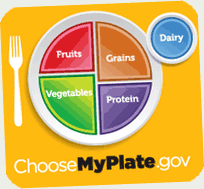
What to eat when you are expecting
Posted in Health & Wellness on March 16, 2012. Last modified on February 01, 2018. Read disclaimer.
Pregnancy brings all sorts of changes into our lives. We start thinking differently and acting differently. Nothing is as important during pregnancy than eating a balanced diet. Everything you eat or drink goes through your baby and can have a big affect on how healthy your child is when they come into this world.
+ Free Shipping & Returns on Eligible Items.
There's no special magic formula for eating for two healthy. While you are pregnant the principles of healthy eating remain the pretty much same, what is good for you is good for the baby too -- be sure to eat plenty of raw fruits, lightly cooked vegetables, nutritious whole grains and very lean protein. There are a few nutrients in a pregnancy that you should be extra aware of and deserve special attention. Here is our list and some sample meals courtesy of the USDA. If you have access to pregnancy multivitamins by all means take them regularly for you and your baby.
Folate and folic acid -- Prevent birth defects
Folate is a B vitamin that helps prevent serious defects of the brain and spinal cord. Lack of folate in a pregnancy diet may also increase the low birth weight and preterm delivery risks. Folic acid is the synthetic (manmade) for of folate and can be taken as a vitamin supplement.
How much you need: 800 micrograms of folate or folic acid a day before conception and throughout pregnancy.
Good sources: Fortified cereals are great sources of folic acid. Leafy green vegetables, citrus fruits, and dried beans and peas are good sources of naturally occurring folate.
Food |
Serving size |
Folic acid content |
Cereal |
3/4 cup (15 to 45 grams) 100 percent fortified ready-to-eat cereal |
100 to 700 micrograms -- choose a cereal with at least 400 micrograms |
Spinach |
1/2 cup (90 grams) boiled spinach |
131 micrograms |
Beans |
1/2 cup (88 grams) boiled Great Northern beans |
90 micrograms |
Asparagus |
4 boiled spears (60 grams) |
89 micrograms |
Peanuts |
1 ounce (28 grams) dry roasted |
41 micrograms |
Oranges |
1 orange (159 grams) |
48 micrograms |
Source: USDA National Nutrient Database for Standard Reference, Release 23
Calcium -- Strengthen bones
Strong bones and teeth require calcium. Your circulatory, muscular and nervous systems also need calcium to function normally.
How much you need: 1,000 milligrams a day. Pregnant teenagers need 1,300 milligrams a day.
Good sources: Dairy products are the richest sources of calcium. Many fruit juices and breakfast cereals are fortified with calcium, too.
Food |
Serving size |
Calcium content |
Juice |
8 ounces (237 milliliters) calcium-fortified orange juice |
500 milligrams |
Milk |
1 cup (237 milliliters) skim milk |
299 milligrams |
Yogurt |
6 ounces (170 grams) low-fat fruit yogurt |
258 milligrams |
Cheese |
1 ounce (28 grams) part-skim mozzarella cheese |
222 milligrams |
Salmon |
3 ounces (85 grams) canned pink salmon with bones |
181 milligrams |
Spinach |
1/2 cup (90 grams) raw spinach |
122 milligrams |
Cereal |
1 cup (20 to 60 grams) calcium-fortified ready-to-eat cereal |
3 to 1,000 milligrams |
Source: USDA National Nutrient Database for Standard Reference, Release 23
Vitamin D -- Promote bone strength
Vitamin D also helps build your baby's bones and teeth.
How much you need: 600 IU a day.
Good sources: Fatty fish, such as salmon and tuna, are great sources of vitamin D. Other options include fortified milk and orange juice.
Food |
Serving size |
Vitamin D content |
Fish |
3 ounces (85 grams) cooked sockeye salmon |
447 IU |
Juice |
8 ounces (237 milliliters) calcium- and vitamin D-fortified orange juice |
137 IU |
Milk |
1 cup (237 milliliters) skim milk |
115 IU |
Asparagus |
4 steamed spears (60 grams) |
89 micrograms |
Eggs |
1 large hard-boiled egg (50 grams) |
44 IU |
Source: USDA National Nutrient Database for Standard Reference, Release 23

Since this article was originally posted, the USDA has introduced a "MyPlate Daily Checklist for moms and moms-to-be" that helps create a personalized eating plan based on your age, weight, stage of pregnancy and other factors.
To get started, visit http://www.choosemyplate.gov/moms-daily-food-plan

